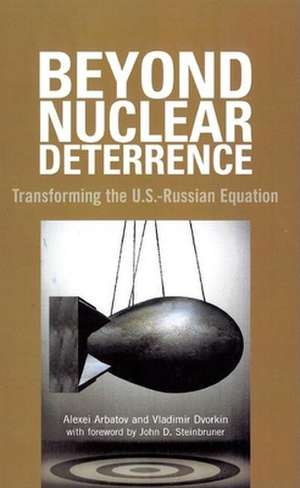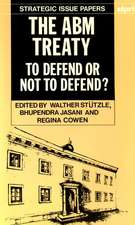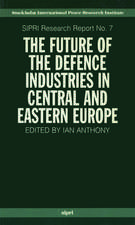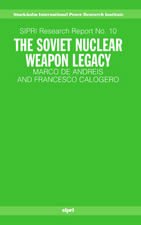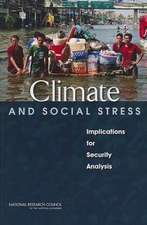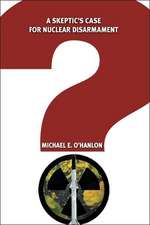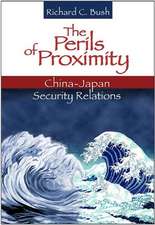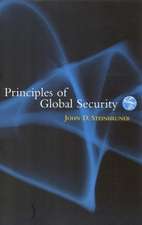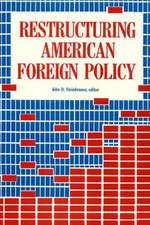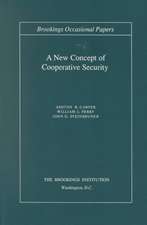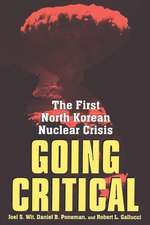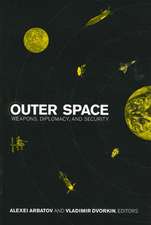Beyond Nuclear Deterrence: Transforming the U.S.-Russian Equation
Autor Alexei Arbatov, Vladimir Dvorkin Cuvânt înainte de John D. Steinbruneren Limba Engleză Paperback – 29 iun 2006
For nearly fifty years, including the decade and a half since the end of the Cold War, deterrence has remained the central nuclear arms control policy between the United States, Russia, and other principal nuclear powers. The question today is: Has the concept of deterrence outlived its usefulness? In Beyond Nuclear Deterrence, two of Russia's top nonproliferation and international security experts, Alexei Arbatov and Vladimir Dvorkin, critically assess the history of deterrence as it emerged between the Soviet Union and the U.S. and evolved through the Cold War to include an expanding nuclear club. The authors argue that while deterrence as a concept has always been paradoxical, it is poorly equipped to handle today's most significant nuclear challenges: proliferation and terrorism. Nuclear arms control must move beyond the deadlock of deterrence. The U.S. and Russia need to take the first bilateral steps to remove mutual nuclear deterrence as the foundation of their strategic relationship and implement changes that can be exported internationally.
Preț: 72.74 lei
Nou
Puncte Express: 109
Preț estimativ în valută:
13.92€ • 14.48$ • 11.49£
13.92€ • 14.48$ • 11.49£
Carte disponibilă
Livrare economică 24 martie-07 aprilie
Preluare comenzi: 021 569.72.76
Specificații
ISBN-13: 9780870032264
ISBN-10: 0870032267
Pagini: 188
Dimensiuni: 140 x 216 x 13 mm
Greutate: 0.25 kg
Editura: Brookings Institution Press
Colecția Carnegie Endowment for Int'l Peace
ISBN-10: 0870032267
Pagini: 188
Dimensiuni: 140 x 216 x 13 mm
Greutate: 0.25 kg
Editura: Brookings Institution Press
Colecția Carnegie Endowment for Int'l Peace
Notă biografică
Alexei Arbatov is scholar-in-residence and co-chair of the Nuclear Nonproliferation program at the Carnegie Moscow Center. He is also and head of the Center for International Security at the Institute for International Economy and International Relationships of the Russian Academy of Sciences. Vladimir Dvorkin is principal researcher at the Center for International Security at the Institute for World Economy and International Relations of the Russian Academy of Sciences and former director of the Fourth Central Research Institute in Moscow. John D. Steinbruner is director of the Center for International and Security Studies at the University of Maryland.
Descriere
For nearly fifty years, including the decade and a half since the end of the Cold War, deterrence has remained the central nuclear arms control policy between the United States, Russia, and other principal nuclear powers. The question today is: Has the concept of deterrence outlived its usefulness? In Beyond Nuclear Deterrence, two of Russia's top nonproliferation and international security experts, Alexei Arbatov and Vladimir Dvorkin, critically assess the history of deterrence as it emerged between the Soviet Union and the U.S. and evolved through the Cold War to include an expanding nuclear club. The authors argue that while deterrence as a concept has always been paradoxical, it is poorly equipped to handle today's most significant nuclear challenges: proliferation and terrorism. Nuclear arms control must move beyond the deadlock of deterrence. The U.S. and Russia need to take the first bilateral steps to remove mutual nuclear deterrence as the foundation of their strategic relationship and implement changes that can be exported internationally.
